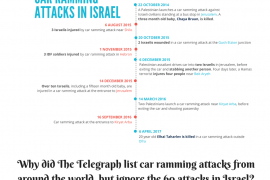The Arab-Israeli War of 1948-49 produced around 711,000 Palestinian Arab refugees, according to official records. (To provide some context to this figure, there were roughly 850,000 Jewish refugees from Arab countries between 1948 and the early 1970s.)
The relevant UN General Assembly document from Oct. 23, 1950 states the following about the Palestinian refugee problem:
The estimate of the statistical expert, which the Committee believes to be as accurate as circumstances permit, indicates that the refugees from Israel-controlled territory amount to approximately 711,000.
While it is estimated that somewhere between 30,000 and 50,000 Palestinian Arabs, out of this original refugee population, are still alive today, the United Nations Relief and Works Agency (UNRWA) allows the children, grandchildren, and great-grandchildren (ad infinitum) of actual refugees to continue to inherit their ancestor’s status. So, based on this bizarre formula, there are officially 4.9 million Palestinians who are eligible for “refugee” benefits.
Robert Tait is the Telegraph’s Middle East correspondent, and you’d therefore expect him to have some familiarity with such statistical and historical details. However, his latest report about the current round of Israeli-Palestinian peace talks contains a passage indicating he is either unfamiliar with the numbers, or unwilling to contradict the official Palestinian narrative on the “right of return” for millions Palestinians who were never actually refugees and never set foot within the boundaries of Israel.
His Aug. 18 story, ‘While Egypt burns, Israel talks peace‘, includes the following:
On the table are the familiar sticking points that have defied several previous peace-making attempts — namely borders, Jewish settlements in occupied Palestinian lands, the fate of almost five million Arab refugees expelled to neighbouring countries during Israel’s 1948 war of independence, and the status of Jerusalem, which both sides claim as their capital.
Whilst the unwillingness of the mainstream media to critically scrutinize the broader refugee narrative is itself a topic worthy of debate, the part of the sentence we underlined is not merely misleading, but a flat-out falsehood – and we intend to hold the paper accountable.



